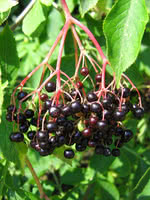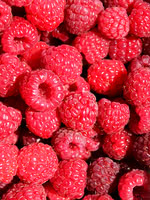Mon-Fri 9am - 5pm Mountain time
Black Elderberry vs Eden Raspberry
Sambucus canadensis
Rubus sp. AAC Eden
NOT AVAILABLE THIS SEASON - MIGHT RETURN
NOT AVAILABLE THIS SEASON - MIGHT RETURN
Black Elderberry is a deciduous shrub native to eastern North America. You can plant this shrub in moist areas and it will help stabilize your soil. You can also use it on rural properties anywhere you'd use a lilac.
Black Elderberries are considered to be partially self-pollinating. So while they will still produce some berries without cross-pollination, planting with another variety will increase yields. Consider planting with Ranch Elderberry or Bob Gordon Elderberry.
Warning: the seeds, stems, leaves, roots, and uncooked berries of the Black Elderberry are poisonous to humans when eaten in quantity. You should cook the berries to make them safe for human consumption.
The Eden Raspberry is a thornless, mid-season producing plant that is vigorous and consistently high-yielding. The berries are some of the largest on the market, and are firm, bright and sweet.
The Eden Raspberry is a fast-growing floricane. This means that raspberries will not grow on canes the year they first grow. The mature canes they do grow on, however, produce more berries than primocane varieties.
Black Elderberry Quick Facts
Eden Raspberry Quick Facts
Toxicity: leaves, stems, and uncooked berries are poisonous to humans

